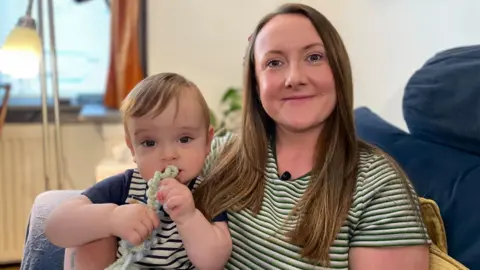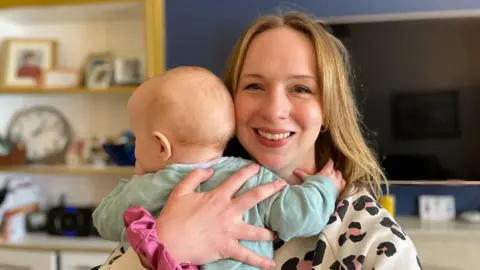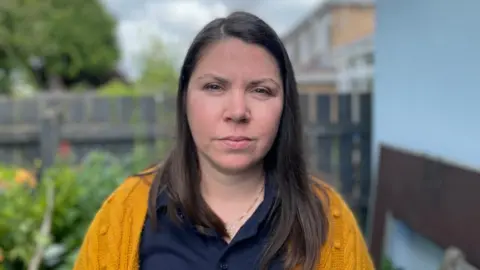Breastfeeding buddies close down after funding cut
 BBC
BBCA breastfeeding support service which has helped mums of newborn babies for a decade has closed down after funding was withdrawn.
Breastfeeding Buddies was run by the National Childbirth Trust (NCT) charity in five hospitals in Greater Glasgow and Lothian, offering peer support to mothers who wanted to breastfeed.
The Scottish government had previously funded the scheme directly but this year it said it had allowed the health boards to decide how to meet local need.
NHS Greater Glasgow and Clyde and NHS Lothian will no longer fund the scheme but said they remained committed to ensuring women get the breastfeeding support they need.
Parents who had used the service told BBC Scotland News they were concerned that midwives and health visitors were already overstretched and would not have enough time to devote to dedicated breastfeeding support.
New mum Katie said she relied on the help of Breastfeeding Buddies when she was in hospital with her son Oliver last year.
He was born premature after a high-risk pregnancy and, at first, she found positioning him for feeding hard.
Katie said: ''They were able to come and check that his latch was OK and just give me that bit of emotional support because it is quite a vulnerable time for a new mother.
"My buddy was able to check the feeding position I had him in to make sure I was OK and help me make some changes to get the best out of initiating breastfeeding.''
Katie said she got a lot of practical support which gave her the confidence to begin breastfeeding in public.
"It's something you think is going to come so naturally to you, however it isn't always that easy, especially with him being premature," she said.

New mother Sophie told BBC Scotland News the breastfeeding support service had been a lifeline when her daughter Nora was born last year.
''I was quite unwell before I had Nora so she had to come a bit early which meant she was taken to intensive care for a couple of days and we didn't get off to the easiest of starts," Sophie said.
"'That put us on the back foot with our breastfeeding.''
Sophie said the maternity wards were busy and staffing was tight and it was not until she got home that issues around breastfeeding became apparent.
She said that being able to go to a community group offering breastfeeding support proved crucial.
"Being able to go to groups with other mums and sharing your experiences and also having the expertise of the peer supporters was really key for us in helping us to continue," Sophie said.

Sadia Malik is a former Breastfeeding Buddy, who volunteered to help in Edinburgh after her baby spent time in intensive care.
Now she's training to become a midwife.
Sadia said: "I've seen how little time the midwives have and every time you go in the wards the midwives appreciate us so much - and the parents.
"As a student midwife, as a mum and a volunteer, I think it's devastating to see that support is going which was so much needed in the hospital and the communities."
Public Health Scotland said there is strong evidence that breastfeeding protects the health of children and mothers.
It said that over the past decade increasing rates among younger women and those from ethnic minorities and more deprived areas had reduced health inequalities.
The Breastfeeding Buddies service was run by the NCT charity in five hospitals and seven community groups.
It had previously been allocated about £70,000 a year from government spending to pay for a staff team of nine part-time workers and a volunteer pool of 82 specially-trained peer supporters, split between Glasgow and Lothian.
The last services closed on 6 June and pregnant or new mums are being advised to go online for support or contact their midwife or health visitor for help and advice.

Former NCT Glasgow services manager Kirsteen Buckney said: "When we first found out that we weren't getting funded, everybody that I work with was worried about the families we support and not about ourselves losing our jobs.
"Statistics show that 90% of parents stop breastfeeding because they didn't have the support to continue, so without the support there that's not a choice for them anymore.
''It's quite heartbreaking.''
A Scottish government spokeswoman said breastfeeding rates were the highest on record, with 49% of mothers breastfeeding between six and eight weeks after birth.
She said a small number of areas had previously seen support provided by third sector organisations through direct Scottish government funding, but this year a decision was taken to only provide funding to NHS boards.
"This will allow them to decide how best to meet local need, in a sustainable way, over the long term," she said.
NHS Greater Glasgow and Clyde said it understood the concern the service being discontinued may bring and it ''remains committed to supporting breastfeeding women''.
NHS Lothian's director of public health Dona Milne said: "We are aware of recent changes to the funding model from Scottish government and are committed to working alongside partners to ensure that women across Lothian get the support that they need."
